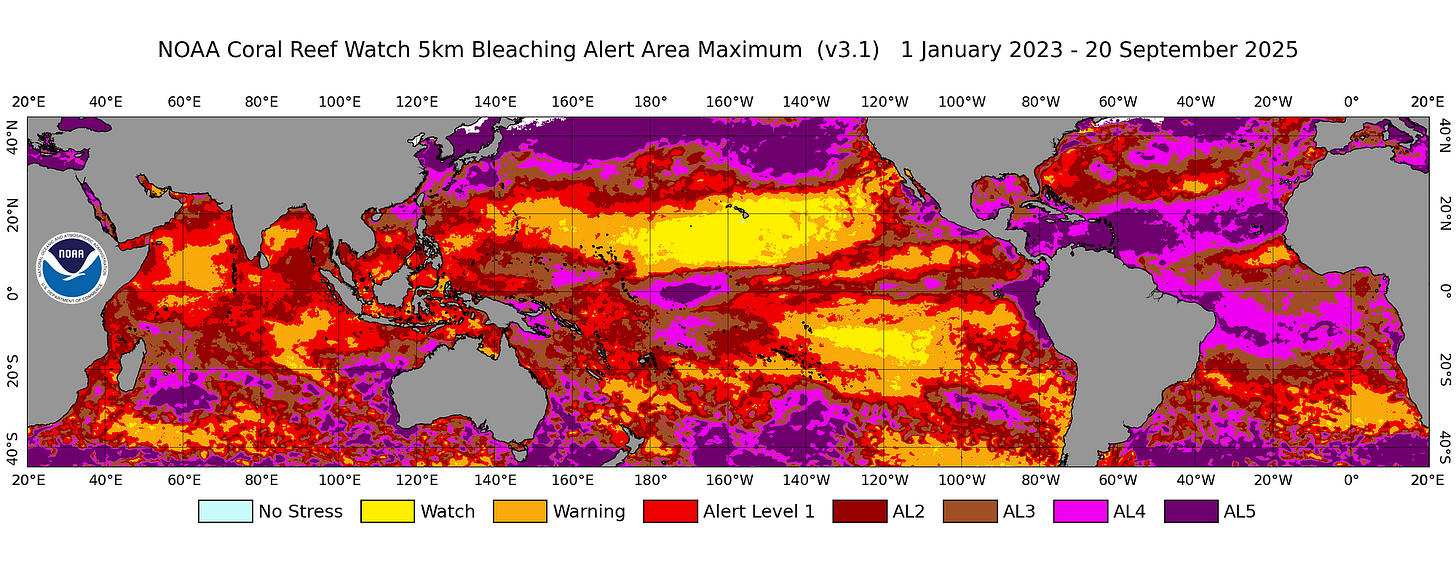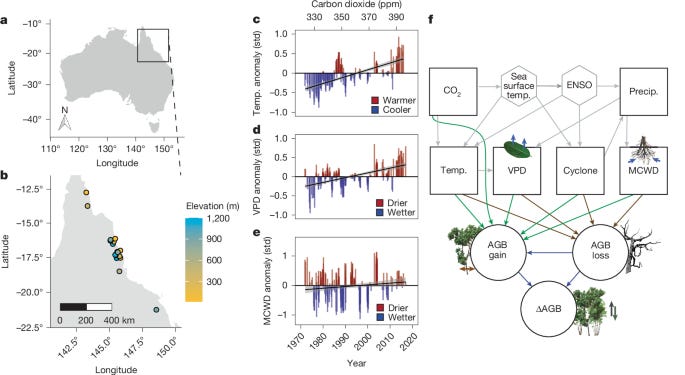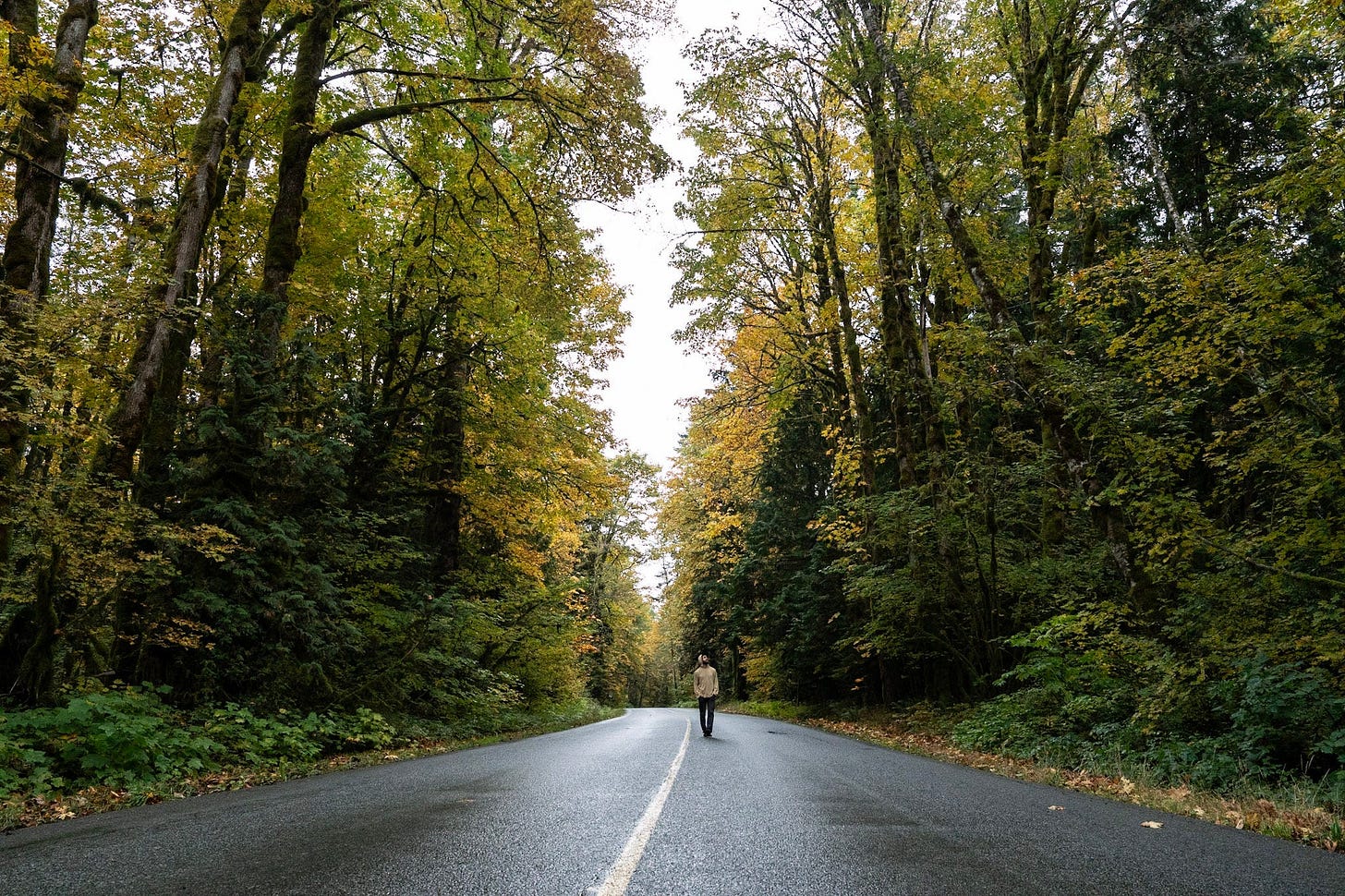The First Climate Tipping Point Has Arrived While Carbon Sinks Are Giving Up
This is the end of the world as we know it
It looked like snow under water: white, endless, and still. The reef, my friend Lisbeth said, was “the most beautiful thing she’d ever seen.” For a second, I almost agreed. Then, I stared at it for a long time before replying. She wasn’t wrong about its beauty. But she was also showing me death.
Bleached coral isn’t a kind of coral. It’s the moment just after the funeral, what’s left when life is gone. A cathedral of bone-white skeletons stretching over an empire of calcified death. From above, it glows like marble. Up close, it’s a graveyard.
That’s when I realized how few of us actually know what coral really is. For years, I didn’t either.
I used to think they simply existed in the background, a passive, ornamental decoration in a tank. They are not. Corals are marine invertebrates, colonies of tiny polyps that build limestone cities in slow motion. They survive through a fragile pact with microscopic algae that feed them through photosynthesis and give them color.
When the ocean heats beyond what their fragile pact can handle, that alliance breaks. The coral expels the algae, losing its food and its color. Its skeleton begins to show through.
That’s what bleaching is. Not beauty. Not transformation. Starvation.
And right now, it’s everywhere.
Because the Earth has crossed its first climate tipping point — only most of us just don’t recognize what it looks like yet.
A Tipping Point Ahead of Schedule
Coral reefs cover less than one percent of the ocean floor. Yet they sustain a third of all marine life and support the livelihoods of more than a billion people. Their global value is estimated at 11 trillion dollars a year — a number so big it feels meaningless when the system it measures is collapsing in real time.
They are the ocean’s rainforests: dense, intricate, full of secret exchanges. And right now, they are dying faster than science ever imagined possible.
The warning signs came years ago. Florida’s summer of 2023 saw ocean temperatures rise above 38°C — hotter than a bathtub. Corals there didn’t bleach gradually; they dissolved. One in five died almost instantly. In Mexico’s Pacific reefs, up to 93% vanished. The heat spread across the Caribbean, wrapped around Africa, and lit the Indian Ocean like a fuse: Madagascar, the Chagos Archipelago, East Africa.
It got so bad that NOAA had to invent three new alert levels just to describe what was happening. The scale had run out of language.
In Australia, the Great Barrier Reef bleached for the sixth time in nine years. Some reefs lost nearly half their coral, leaving graveyards where color used to live.
This is no longer “a bad season.” It’s an unfolding extinction process.

Since the heatwaves of 2023 began, 84% of reefs across 82 countries have bleached — up from 68% in the last major event of 2014–2017. Ocean heat has spread like a subaquatic wildfire, fueled by record-breaking years in 2023 and 2024 and a third following in 2025. Coral bleaching has stopped being an event. It’s now the baseline.
Even the last “refuges” (Indonesia’s Raja Ampat, Israel’s Gulf of Eilat, and the deep Pacific sanctuaries once believed untouchable) are ghosting into white. That’s the cruel nature of thresholds: you only see them once you’ve crossed them.
The bottom line is that heat stress may never again fall below the threshold that triggers mass bleaching in our anthropological timelines. Human-induced climate change has locked coral ecosystems into a permanent crisis. Even if we stopped emissions today, severe degradation is now inevitable, one that will lead to irreversible planetary changes with catastrophic implications for us carbon-addicted humans.
Tipping points pose a new type of threat that current international structures and agreements are not designed to counter. We’re looking at something that’s completely changing the face of our planet and the ability of our oceans to sustain lives and livelihoods.
Welcome to a new reality for the planet that scientists had once believed was still far away.
The collapse of coral reefs is not an isolated tragedy. It’s a signal flare: one tipping point crossing into another.
The same global report on climate tipping points warns that the reef crisis is only the first in a chain reaction. The planet is now skirting dangerously close to others: the thawing of Arctic permafrost, the slowdown of the Atlantic Ocean’s circulation, the melting of Greenland and West Antarctic ice sheets, the death spiral of the Amazon rainforest, and the collapse of South Asia’s monsoons.
Twenty years ago, scientists thought we’d need four to five degrees of warming to trigger such irreversible changes. Now, it’s happening between one and two — and a UN report projects we’re on track for 3.1°C by the end of this century.
These aren’t distant hypotheticals. They are planetary organs beginning to shut down. And like the reef, once they cross their threshold, there’s no way back.
In the meantime, another carbon sink just turned carbon source, with all the compounding accelerating ripple effects this could bring.
A Greener Tropical Forest is Now a Carbon Source
For decades, we’ve counted on forests to fight climate change, soaking up carbon from our fossil-fuel addiction. Protect them, the logic goes, and they’ll help us fight climate change. But the latest research from Australia’s tropical rainforests is rewriting the script in a reversal so stark it should make us rethink everything we assumed about nature’s resilience.
Trees are dying faster than new growth can replace them, twice as fast. Tropical species adapted to warm, wet, stable conditions are struggling under extreme heat and drought. Woody biomass (the solid, stable carbon stored in branches and trunks) is shrinking. Meanwhile, cyclones, growing stronger and creeping further under climate change, rip through the canopy. And so, carbon that should have stayed locked in trees is returning to the atmosphere.

The forest, once a carbon sink, is now a carbon source, just like the Arctic tundra turned against us last year. And just like the coral tipping point, the timeline has severely accelerated beyond predictions: the research indicates the shift likely happened about 25 years ago. We only noticed it now.
Sure, higher CO₂ should make trees grow faster and increase how much carbon tropical forests can take up, yet it doesn’t. Australian forests are greener than they were in the 1980s, but this extra leaf isn’t turning into wood. Instead, carbon cycles straight back into the atmosphere through roots and soil microbes. Photosynthesis alone isn’t enough to fight the warming planet.
We can’t assume all tropical forests will behave the same way. South American rainforests are already showing decline, while African forests seem more stable. But the Australian findings are a warning flare: even ecosystems we’ve long counted on as carbon allies can flip.
We don’t know yet whether all tropical forests will respond similarly. Evidence on carbon sink capacity is mixed. Rainforests in South America are showing a decline while African rainforests are generally not.
One thing is clear: their protection remains essential despite the climate risks they face.
This Is More Than a Footnote
This is a gut-level reminder that nature’s balance is precarious and interconnected. Coral reefs that breach the first climate tipping point, rainforests and permafrost that switch from sink to source, oceans that slow and acidify…The dominoes are falling, and each falling piece amplifies the next, feeding a cascade of consequences that models from twenty years ago never predicted would occur in our current circumstances.
And yet, here we are, with the greener lungs now feeding the fire of warming, and the hypnotic white under the ocean as the first ominous sign of no return.
May the northern lights guide you,
M.







"The first climate tipping point has arrived." Yet still we have climate change denialists. We have Greta Thunberg abused by online trolls and both physically and indecently assaulted by Israeli military personnel simply highlighting the decimation of the Palestinian people. We have right-wing political parties and ideologues vowing to eliminate or drastically reduce climate targets and we have even some supposedly 'people first' parties renewing fossil fuel leases, approving new ones and even subsidising some.
I think that the actual greatest threat to humanity and to our planet is what I would call 'Intelligent ignorance' or 'Ignorant intelligence' - I can't quite decide which is better. Perhaps you have something more appropriate, in which case I'd like to hear it. - What I mean it that we have millions or even billions of literate, relatively well educated, well informed and in many ways capable and competent and even caring human beings who, none-the-less, act and speak and write either denying that there is anything to be concerned about with global warming and/or lobbying for or supporting the continued use and even exploration for fossil fuels and often arguing, usually with false figures or statements, that renewable energy sources cannot meet our demands. That, in fact, flies in the face of all that science has shown us and even the many innovations that have transpired already.
One has to wonder at why these otherwise reasonable and intelligent people can behave in the way that they do. How is it that they apparently have no regard for their successors - their children and grandchildren and/or those populations on low lying islands or areas whose very homes, communities, culture and heritage is already showing the signs of degradation, erosion, rising sea levels and reducing land mass?
It seems that, as this calamity continues, there is a rise in right-wing and even the extreme right wing ideologies that are as deluded and insane as was Hitler's notion of a 'Master Race'. Do they think that if they manage to take over all the governments and rule the World that they'll be able to rule the climate and tell it to stop misbehaving? - I apologise, I shouldn't even begin to make this any sort of joke for it is not.
If all this misguided behaviour is what we can expect then I cannot see humanity lasting past the end of this century, let alone for another millennium. Doom-sayer - I don't mean to be. I'd rather feel positive and encouraged but when even left wing politicians seem only too willing to bow to corporate profit takers and those with immediate self-interest, I find it hard not to read the writing that has been ignored for so long and remains so by so many, despite the wall being all around us and the writing writ so large, it is ever more plain to see.
Fucking stupid, stupid humans. 💔😢